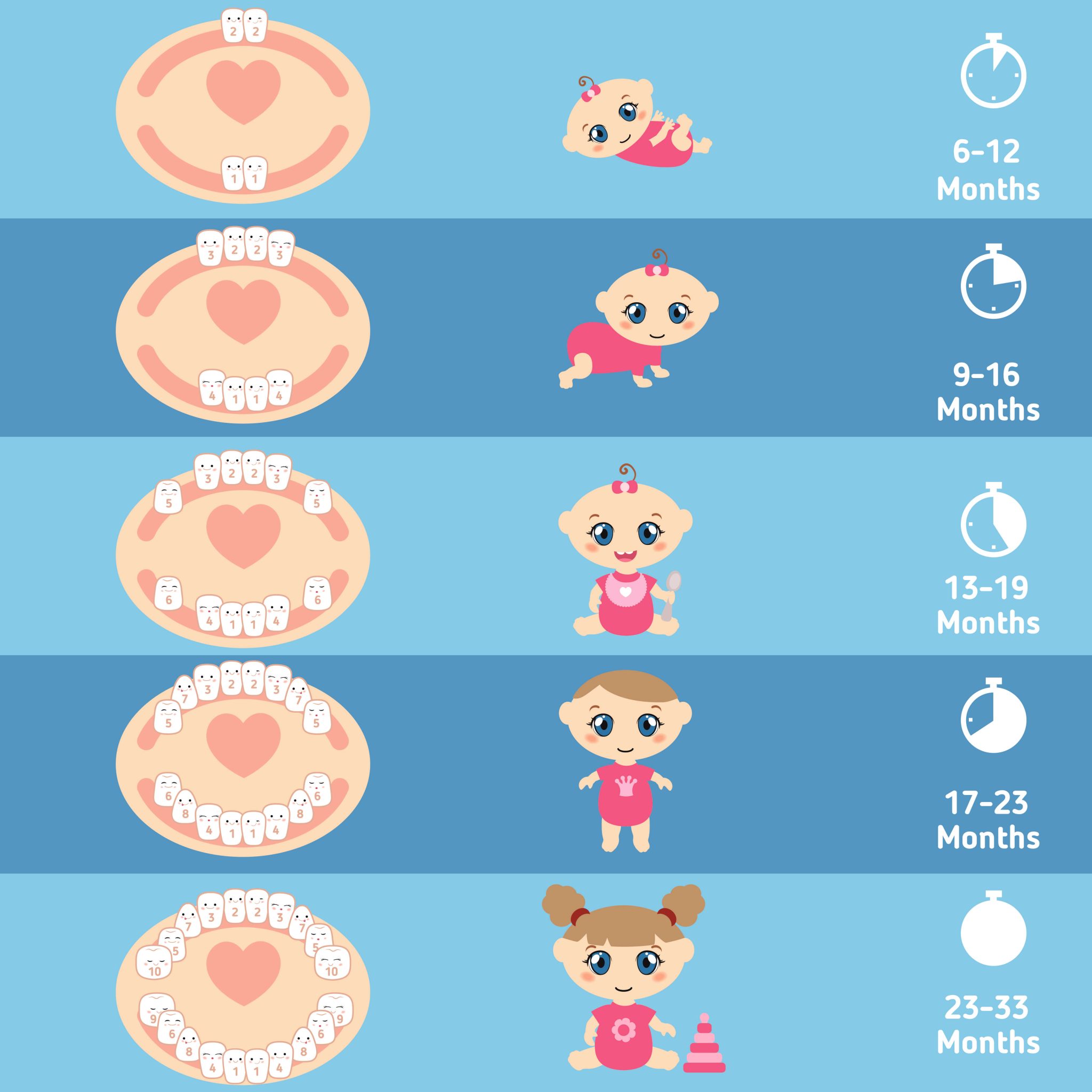Teething is one of the most difficult stages that children are exposed to, and many parents suffer from it when changing the teeth of their children.
In this article, I am going to share with you my personal experience with my son's teething, it was a really difficult and tiring journey.
I will share with you how I dealt with that experience, and what strategies I used to overcome the difficulties of this stage.

The emergence of baby teeth: infant teething
The appearance of baby teeth is a natural process that occurs in the first stage of a child's life, as infant teething usually begins at the age of three months and continues until the age of twelve months.
This stage is painful for both the child and the mother, as mothers often complain of lack of sleep due to the child's sleep disturbances and swinging, and children suffer from gum pain, excessive crying and irritability.
However, teething is characterized by the fact that it does not have any negative effects on the health of children, as milk teeth serve as a model for permanent teeth, and they can be identified through the symptoms mentioned, such as high fever, skin rash, diarrhea and constipation.
Despite the suffering of children and mothers at this stage, with the necessary care and the use of appropriate natural alternatives, the pain of teething can be alleviated and this stage can pass smoothly.

Common symptoms of teething pain
Children may feel severe pain during teething, and their behavior and mood can change temporarily, and a common symptom of teething pain is excessive drooling, gum congestion and swelling, in addition to difficulty sleeping and a sense of exhaustion and discomfort.
It is important to note that these symptoms may differ from one child to another, but mothers can be assured of appropriate sedation measures and appropriate advice to give their children the necessary comfort and care during this painful phase.

How to deal with teething pain in children
When babies suffer from teething pain, they need special attention and care.
Doctors recommend massaging the gums with a clean finger or wet gauze to relieve pressure on them and relieve pain.
A cool spoon or a cooled teething ring can also be used to relieve heat and pain on the gums.
After trying these alternatives and the child is still in pain, you should consult a doctor before giving painkillers.
It is also recommended to offer cold and soft foods to relieve pain and stimulate tooth growth.
Care must be taken to calm the child and not focus on the causes of pain, so that he does not feel anxious and disturbed.
Natural alternatives to relieve teething pain
No parent wants to see their child suffer from teething pain, but natural alternatives can help relieve teething pain in babies.
You can start by gently rubbing the gums for a few minutes using clean hands.
A cool, damp cloth can also be used to relieve pain and discomfort.
For those who prefer alternative solutions, there are many natural and safe recipes available in the market, such as those for rubber or plastic teething.
Babies can also use a pacifier to control colic, but they must be supervised.
Caution - If the pain persists for a long time, it may be necessary to see a doctor for teething treatment.

Cases that require a doctor's visit to treat children's teething
Teething pain is common among infants, but there are cases that parents should pay attention to and see a doctor immediately.
Among these cases, if the pain and high temperature persist for a while, it may mean that there is an infection.
And if the child has breathing difficulties or the taste seems abnormal, this may indicate gingivitis.
In severe cases accompanied by a rash, a visit to the dentist to treat the condition is necessary.
Therefore, parents should pay attention to any abnormal symptoms that appear on the child, and go to the dentist in case of need for appropriate treatment.

How to recognize the symptoms of teething in infants
Teething babies suffer from several symptoms that are the worst moments for mothers.
Among these symptoms are drooling, irritation in the gums, sensitivity, anger, fatigue, poor appetite, difficulty sleeping and shortness of breath.
The symptoms of teething in infants can be identified by observing the changes in their behavior, sleep pattern, and interactions with the mother and the things around them.
Parents must understand that it is a normal stage of a child's development, and that alleviating teething pain requires patience, understanding, and dealing in a gentle and loving manner with the child.
Among the effective ways to relieve teething pain is the use of cooling motors or giving the child cold foods that reduce inflammation and swelling, in addition to playing and caring for the child to relieve tension and feel comfortable.

The effect of teething pain on the child's health and behavior
Teething pain affects the child's health and behavior during the teething period, as the child feels discomfort and pain, and this would negatively affect his sleep and general development.
It also causes the child's behavior to change, becoming moody, volatile, and emotionally unstable.
Parents must be patient and affectionate with their children at this critical stage, and try to provide help and support and relieve pain, whether with tenderness or using natural alternatives to relieve teething pain.
They should also perform their basic duties in taking care of the child's health, and some cases may require a visit to the doctor to obtain the necessary treatment.
Tips for relieving teething pain in infants
Mothers find it difficult to deal with the teething pains of their children. In addition to the constant crying, teething pains can affect the health and sleep of the child.
To relieve these pains, mothers can try some useful natural tips.
For example, teething toys such as plastic or rubber, which the child can bite on to relieve gum pain, can be offered.
It is also recommended to gently massage the gums using a clean finger or a piece of cloth soaked in cold water to soothe the pain.
Giving babies cold water may also be helpful in relieving teething pain.
In short, mothers can try many ways to relieve teething pain, find what works for their baby to get through this difficult phase and improve the baby's health and comfort.

Foods suitable for relieving teething pain and stimulating tooth growth
Food plays an important role in relieving teething pain and stimulating the growth of teeth in infants.
From natural juices and fresh fruits to vegetables and solid foods for babies, there are plenty of foods that can be eaten to reduce teething pain and improve oral health.
It is possible to give infants some options, such as sweet potatoes or slices made of meat, or even a group of vegetables that soothe the gums.
To treat those annoying pains, foods should contain many beneficial natural ingredients such as calcium and vitamins.
With the right methods, babies can relieve teething pain and stimulate healthy and safe tooth development.
My personal experience with my son's teething and how I dealt with the symptoms
The experience of mothers is very important in helping other mothers to know how to deal with the teething of children, and among these experiences is the experience of the author with the teething of her son.
Her son was suffering from severe pain and refused to eat because of teething. She applied many solutions and natural methods to relieve teething pain.
Among these methods, she used a cool, wet cloth and its soft texture to massage the gums, and she also used a natural tooth exfoliator to relieve pain and give her son relief.
In addition to the therapeutic methods, the author personally took care of her son and provided appropriate foods to help him relieve the pain of teething.
Thanks to these natural solutions and methods, the author was able to relieve her son's teething pain and reduce stress and tension when it comes to teething children.
How many days does the child's temperature rise when teething?
It is known that teething can cause a slight increase in the temperature of the child at a rate of no more than 37.8-38.3 degrees Celcius, and this rise continues for a period of three to four days before the appearance of the tooth.
In the case of a temperature above the normal possibility, you should go to the doctor to check on the health of the child.
However, this does not mean that the child must have symptoms during teething, nor is it likely that there is a direct link between temperature and the teething process.
In normal cases, a child may need certain measures to relieve the pain and stress associated with teething.
However, the child's ability to endure and adapt is one of the main factors in overcoming this critical stage of his development, and witnessing the completion of the successful teething process in the correct practice of dental hygiene in the future.
How do I relieve teething pain in children?
Teething is one of the most difficult stages of development for parents and children alike.
At this stage, the child feels severe pain and itching in his gums, which requires great attention and constant monitoring by the parents.
Fortunately, there are natural alternatives that can be used to relieve or reduce the pain of teething in children, such as feeding with refrigerated milk and eating cold and soothing foods.
A cool, damp cloth can also be used, or frozen fruit can be placed in a baby food net.
These methods help greatly to relieve teething pain in children, and come in addition to other home remedies that can be used, which come from the experiences of previous mothers, and some of them need to consult a doctor.
How do I know if my baby is teething?
Teething is one of the important stages in a child's life, and the signs of teething in infants cannot be ignored.
To realize these signs, the mother can notice some apparent changes in her child, such as sleep disturbance, mild fever, increased salivation, desire to bite and chew on things, desire to hug and stick to the mother excessively, continuous crying and difficulty in relaxing.
The mother must make sure of these symptoms, and take all measures to relieve her child's pain and comfort when the teething stage begins.
Does teething make a child nervous?
During the teething period, the child suffers from severe pain and discomfort, which affects his mood and makes him nervous.
Pain and discomfort cause him to feel frustrated and resentful, which is reflected in his eating behavior.
However, this condition can be reduced by using some natural solutions such as biting teething rings and temporary use of cold.
It is also recommended to motivate the child to continue eating and to maintain a healthy and balanced diet.
And don't forget to see your pediatrician if the pain continues and you feel confused.
